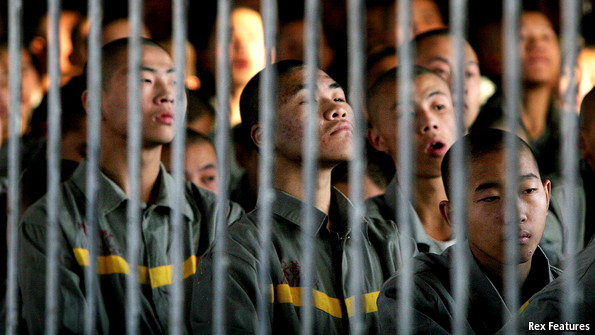Juvenile crime
Hard times
How young criminals are treated says much about the urban-rural gap

SEPTEMBER 26th a court sentenced a 17-year-old boy to ten years in prison for his part in the gang rape of a woman in a Beijing hotel. The sentence drew widespread attention because the boy, Li Tianyi, was the son of famous singers in the Chinese army. Less noticed, though, were the suspended sentence and release of two of Mr Li’s juvenile accomplices, even though they pleaded guilty.
Although online attention, and the boy’s famous parents, meant that the authorities felt they had to make an example of Mr Li, the other youths had two things in their favour that highlight the gap that has grown between rural and urban China: they were urbanites, not migrants, and they could afford to pay sizeable compensation to the victim (almost $25,000 each in this case). Chinese courts are more likely to imprison rural and migrant youths than their city peers.
The number of juvenile criminals sentenced by courts each year in China more than doubled from 2000 to 2008, to almost 89,000, at a time when the population of young people was dropping. (The number of offenders has since decreased.) But violent crime appears to be rising substantially as a proportion of juvenile offences. In a 2010 national survey, 16% of juvenile offenders were arrested for rape, a 42% increase from a decade before; and 12% were arrested for aggravated assault, a 69% rise.
National surveys and data from big cities point to two particularly serious social issues behind those bald statistics. First, more rural children are committing crimes, whether as migrants in cities or among the 60m youngsters left behind by parents who have migrated. Two-thirds of juvenile offenders in the 2010 national survey came from rural areas, up from just over half a decade earlier; and in many of China’s bigger cities, where rural migrants account for a substantial portion of the young population, they can account for as much as 90% of juvenile offenders.
This problem is compounded by the second issue: migrant and left-behind juveniles are far more likely to be incarcerated than their peers who were brought up in the cities, even though surveys suggest that urban young people commit proportionately about the same number of violent crimes as migrant young. In Shanghai, juveniles without local household registration were given suspended sentences (or probation) in only 15% of cases in 2010; locally registered young folk went free on suspended sentences 63% of the time.
The reasons the migrant young are more likely to be punished severely are closely related to the reasons they get into trouble in the first place: their migrant status and their relative poverty. Without a proper household registration, or hukou, from their new city (impossible to obtain for most), migrant teenagers are often barred from attending urban secondary schools, and left to their own devices. Shanghai in 2010 had 570,000 migrant children aged 15 to 19 who were ineligible for the city’s high schools. They are eligible for prison, though. Many courts will not even grant probation to migrant juveniles because they lack a localhukou. And for those who are poor, the inability to pay compensation is another reason why they are denied release. Such payments, as in the Beijing rape case, are usually a mitigating factor in sentencing.
Young people left behind by migrant parents, meanwhile, are more vulnerable to being incarcerated if they have no guardian. Their rural home towns lack resources to monitor children on probation, so they end up in prison. They also appear more susceptible to trouble in the first place. The Centre for Child-Rights and Corporate Social Responsibility, a Beijing partner of Save the Children Sweden, conducted a survey which found that 60% of left-behind children felt their parents were “not around” when they needed support.
China’s record of urbanisation over the past 30 years has been a successful one for many migrants. Chinese cities have poor districts, but they are nothing like the worst slums of other developing countries. Now some urban governments have started to address juvenile justice in ways that should improve the lot of youngsters, including migrants. From 2002 to 2009 Save the Children UK worked in the southwestern city of Kunming to divert youth offenders away from punishment and into the care of “appropriate adults”, or social workers. Beijing and Shanghai have adopted similar approaches. And revisions to the national criminal code, in effect this year, specify that juvenile offenders should be treated more leniently than adults. Officially the emphasis is on education over punishment. Still, migrants tend to benefit less from these reforms than urbanites, and there is no sign that the underlying causes of inequality—especially the hukou system—will be scrapped soon. Without that, it will be difficult to prevent the gap widening even further.
No comments:
Post a Comment
Comments always welcome!